George Juries. (Paul Botes/M&G)
George Juries was not a happy man. From the yard in front of his workshop he watched the constant flow of people up and down the main road, past the empty “places of interest” sign at the entrance to Genadendal. He watched them climb into the Du Plessis buses, some to meander through the Theewaterskloof on their way to the nearest major town, Caledon; others to fruit-packing jobs. People ambled down the road to their neighbours while cavalier young men rode their horses, one or two with a bathroom mat for a saddle, around the village.
All this life in Genadendal was going on in April, but there was not a mask in sight and no attempts at physical distancing. The words “coronavirus”, “Covid-19” or even “pandemic” seemed to exist elsewhere. With the hard level-five lockdown in effect, people were expected to stay indoors, but they had defied this order. And as he watched from his yard, with the sounds of metal clanging on metal and a pop song drifting out from his workshop, this made Juries decidedly unhappy. Something had to be done.
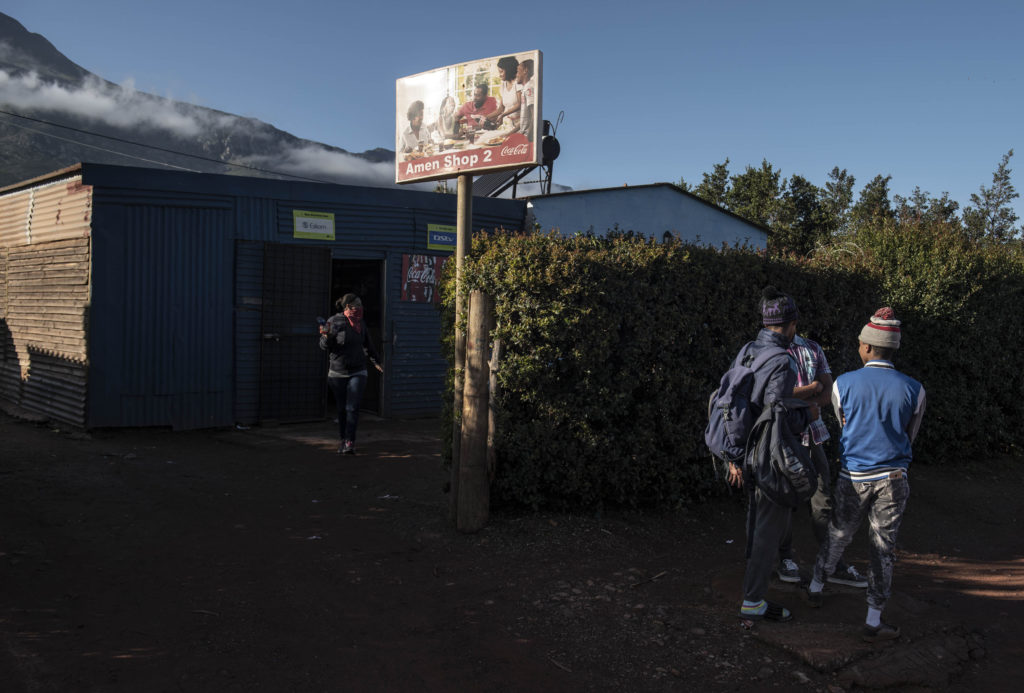
A shopkeeper, “a Somalian” it was said, had become the first reported case of Covid-19 in Genadendal. That it was a “nakka” — as foreign shopkeepers are called in Genadendal — got tongues wagging. The shopkeeper had tested positive and people were informed only four days later, some Genaalers said. When he tested positive, he ran away from hospital and no one had seen him since, others claimed. His brothers, who work with him, were in hiding. A policeman had also tested positive, but the police were hiding the case of a second infection, so the story went.
Genadendal has one main street that runs in a horseshoe, past Kersiedorp, where the poorer people live in this newer part of the village, and the police station; past the clinic and welfare organisations; over the bridge and past the Moravian church complex and up and out the other end. It’s at this end, on a Friday afternoon, that George Juries, with the assistance of a municipal digger and the police, dumped a load of sand, blocking off the one entrance to Genadendal.
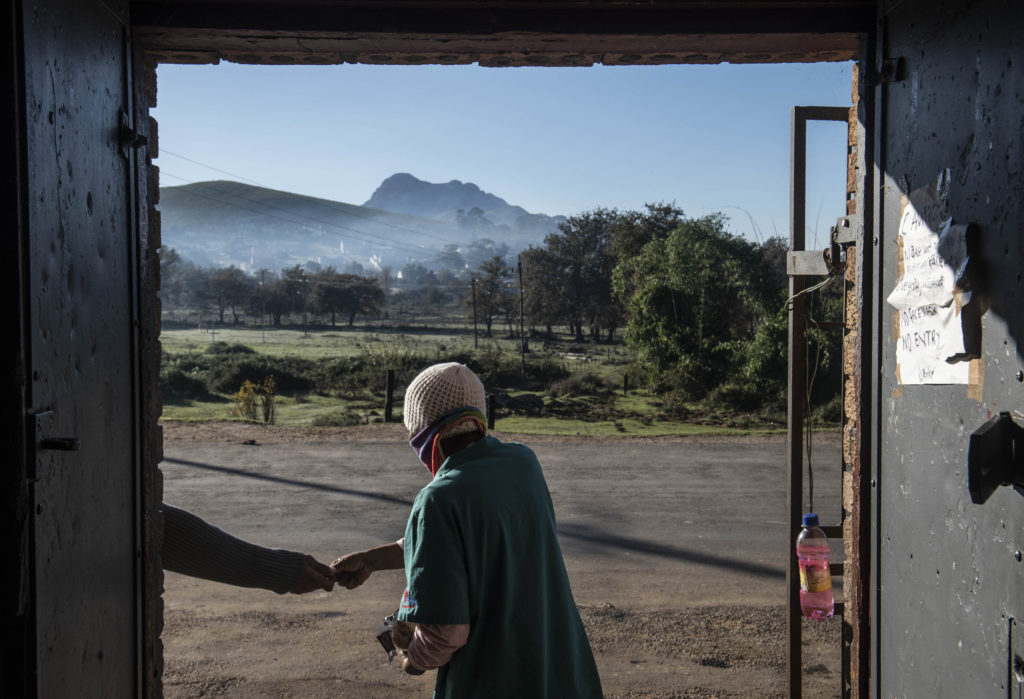
“I closed the entrance just to make people aware; to help police control things. My biggest concern is that there was no plan. We saw that the moment we can stop the movement of the people, that’s the moment we can stop the movement of the virus,” said George Juries.
By the time he went to bed that night, the picture of the road closure had made its way to the Western Cape provincial government and regional police headquarters. They were not happy.
The Valley of Grace
The population of Genadendal, set in a valley that lies along a 140km meandering drive through the Boland and over the rugged Riviersonderend mountains in shades of grey, blue and green, is about 6 000 people. Many of the families can trace their heritage back to the original Khoi inhabitants of the area. The town came into being with the arrival in 1738 of the Moravian missionary, Georg Schmidt. Here he found converts among the Khoi people, whose numbers had been decimated by the smallpox epidemics. An account of this period can be found in the Daghregister of the colonial government in Cape Town.
May 6 1713: “Even the poor Hottentots are not free, but disastrously do not know the disease and have never seen it and, in consequence of their medical ignorance, are thus very disastrously smitten.”
May 7 1713: “ … the government has had buried nine Hottentot corpses, which were lying stinking in their huts, to avoid further bad air.”
May 19 1713: “Today the news was received that some of the surviving Cape Hottentots, who wished to escape the sickness by fleeing over the mountains to another tribe, have been mostly killed by the latter — with the exception of a few who escaped — for fear that the pox should break out among them: a rigorous policy.”
Two more smallpox outbreaks would occur in that century, in 1755 and 1767, disproportionately affecting the indigenous populations and slaves. The epidemic, together with the ever-growing encroachment of settlers on Khoi land and theft of their livestock, saw the various clans under increasing pressure to be ever on the move. What began as a Khoi settlement and then a mission station would later become a refuge for freed slaves in 1838, and also an important touchpoint for anti-apartheid activists. In 1995, Nelson Mandela would honour the town by renaming the presidential residence in Cape Town Genadendal, Valley of Grace.
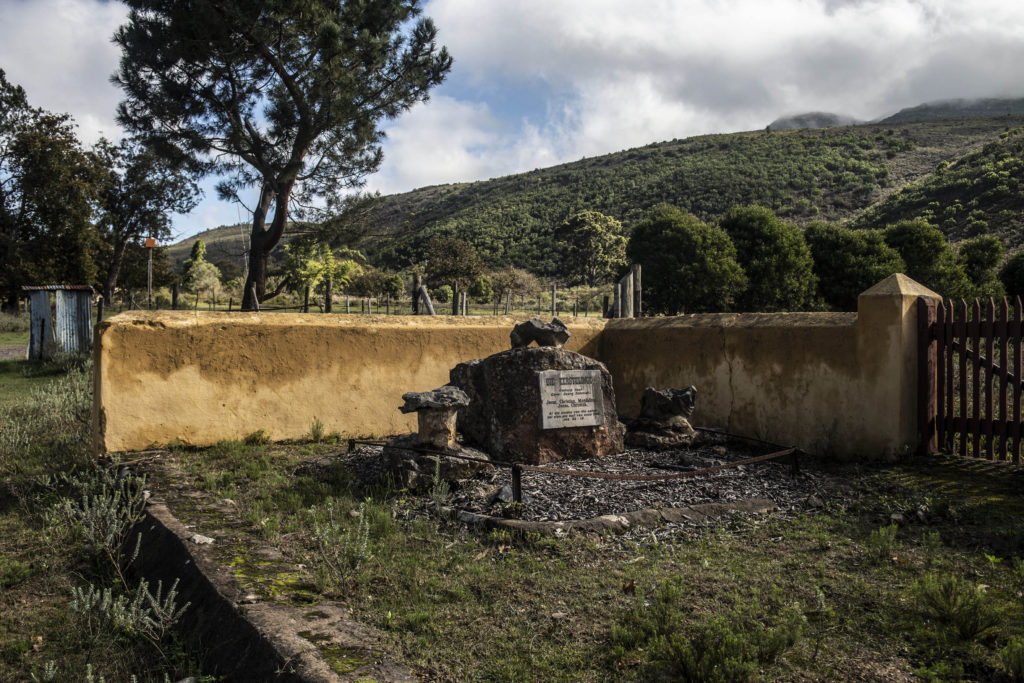
Today a large proportion of Genaalers rely on seasonal agricultural work. Fortunately for many, they were able to complete the harvest before the Covid-19 lockdown took full effect. Others, such as those employed in the Expanded Public Works Programme, saw their monthly income cut from R1 200 to R750. Despite this, they do not qualify for food parcels.
Enter the money lender
For some, this has driven them in desperation into the expectant arms of a character familiar to so many, the money lender. Like a benevolent plaas baas of old, the money lender controls many people’s finances and ensures they’re clothed and fed. But, like the plaas baas, he (for it is almost always a man) tries to fulfill all the needs of those people in his “care”, a modern-day general dealer. He sometimes also doubles as a shebeen owner and drug dealer.
For those looking for something more extravagant, the money lender will even keep a small stock of luxury brands such as Nikes or Adidas. He sits with people’s social grant and bank cards and, come payday, will occupy an ATM machine for protracted periods of time. The groceries sell for inflated prices. People’s identity documents are held by the money lender, to ensure no clevers decide to get a new social grant or bank card and cut him out of this finely tuned arrangement. According to various accounts, the money lender’s business boomed during lockdown.
“Thirty, fourty, fifty percent! They’re robbing the people and keeping them desperate,” said an exasperated Margaret Nefdt. Dressed in her kitchen overalls, 78-year-old Nefdt moved around her sparse space with its cavernous freezer and log book on a small table. She runs a soup kitchen from the centre of town, which the most desperate locals visit daily for a warm, home-cooked meal.
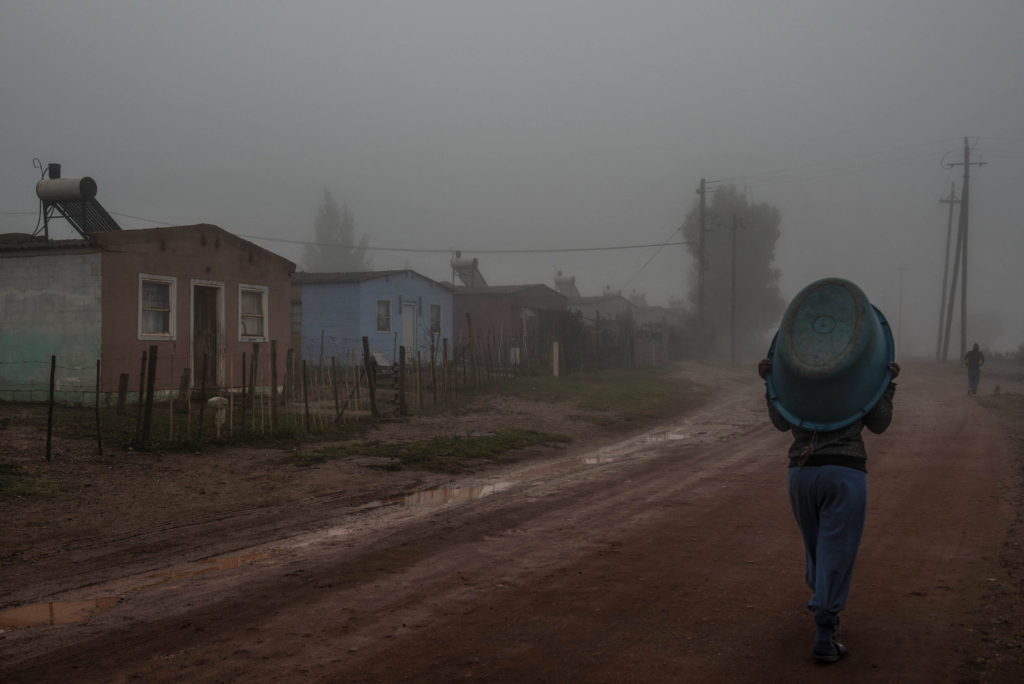
Many of those who show up her door and sign the registration form required by the department of social development are older people. The documenting of those who are fed helps ensure that food is restricted to those who do not receive a social grant, much to Nefdt’s frustration. With Covid-19, the number of people at her door has increased. “You don’t know what troubles people face, so how can I turn away someone who asks for a plate of food?” she reasoned.
Anna’s story
Some of the young people who come knocking on Nefdt’s door are drug addicts, hooked on the ubiquitous Cape cocktail of mandrax and crystal meth, or tik. Like Anna*.
At 34, Anna has five children aged 14, 12, 10, seven and two. She hardly knew them, having spent most of the past decade hustling, hooked on tik and buttons, the street name for mandrax. She’d spend the night sleeping in dirty communal toilets and, when she wasn’t high, would lie there, terrified of being raped.
When Anna came up the street, her children would often be playing in front of their grandmother’s two-bedroom house, but “they’d pretend like they didn’t see me”. There were times when Anna would pry her way into her family home, plying her mother *Harriet with promises that she’d kick the habit. After Anna left it would take her mother days to gather a full account of what had been stolen. “Meat, sugar, coffee, whatever I could lay my hands on. I’d sell it,” said Anna. The times when she was barred from home, Anna’s youngest children would save bits off of their own plates to make up a meal for her. Harriet, like too many parents, prayed and begged: “When will she stop?”
Then came Covid-19. Anna counts the start of the lockdown, March 27, as the first day of her being drug free. “The lockdown made it easier to stay indoors, out of trouble. To be honest, I’m really grateful for Covid,” she said. Anna works on a farm for two days a week. “It feels good to be bringing something in, rather than stealing.”
Her bed, a two-seater couch, is the only furniture in the three-by-three-metre lounge she shares with her youngest child. Above the fireplace Harriet has placed the children’s diplomas and certificates. Paintings of ocean scenes and a picture of Harriet’s erstwhile boss and his wife posing in front of a waterfall fill the remaining space.
With lockdown regulations relaxed, Anna is a familiar sight on the rutted dirt road in front of the family’s home, keeping the children entertained with simple games. “The kids calling me mummy makes me really feel good. I’m trying to make up for the life I’ve missed out on,” she said.
As the children play their cleverly improvised games, adults with places to go walk the streets, passing youngsters lingering on street corners, seemingly ever watchful. Less than a handful of the people in a three-block radius are wearing protective masks. “People are becoming more aware, but it’s mostly the older people who are taking this thing seriously,” said Margaret Africa, the head of Genadendal’s Legal Info Desk.
Raising awareness
Her organisation has been at the forefront of raising people’s awareness of Covid-19. To minimise contact situations for those most at risk, the organisation does home deliveries of chronic medication for people suffering from an array of common ailments such as hypertension, high cholesterol and diabetes.
From a small office at Monument Square, at the business heart of the village that now largely consists of social-welfare organisations, the half-dozen community health workers make their way to the various parts of Genadendal to spread the word about the pandemic. At times they don’t go further than the front gate when they visit people with comorbidities, fearful of the risk that Covid-19 holds. With only two confirmed cases of Covid-19 in Genadendal, Africa understood why most people here are still seemingly unperturbed by the march of the virus. “Covid can be with us for very many years still. And in the end we’ll all get it,” she said pragmatically.
From the Legal Info Desk offices, along the tar road, past the clinic and up along the slope of the valley the dirt roads wind their way into Kersiedorp. Close to the centre, the Amen tuckshop is a hive of activity, with people emerging with a cold drink under their arm, a loaf of bread or a few teabags. It’s the first day that the shop has been open since it, together with at least three others, was closed for 14 days under quarantine.
‘Everything is under the God’
“The people were saying that if we stayed closed any longer they were going to toyi-toyi,” said shop owner Ashebo Nigussie, who is Ethiopian and who locals call “Lukas”.
When he first experienced body aches and a headache he decided to visit a hospital in Hermanus, about 80km away. His tests revealed he had Covid-19. “At first I was a little scared, but even then I knew that everything is under the God, not over the God,” said Nigussie.
He was referred to a lodge, at which he would remain quarantined for two weeks. After three days the body pains and headaches had abated. Nigussie knows nothing about the consternation that his testing positive caused and insists that he’s experienced nothing but kindness from his neighbours.
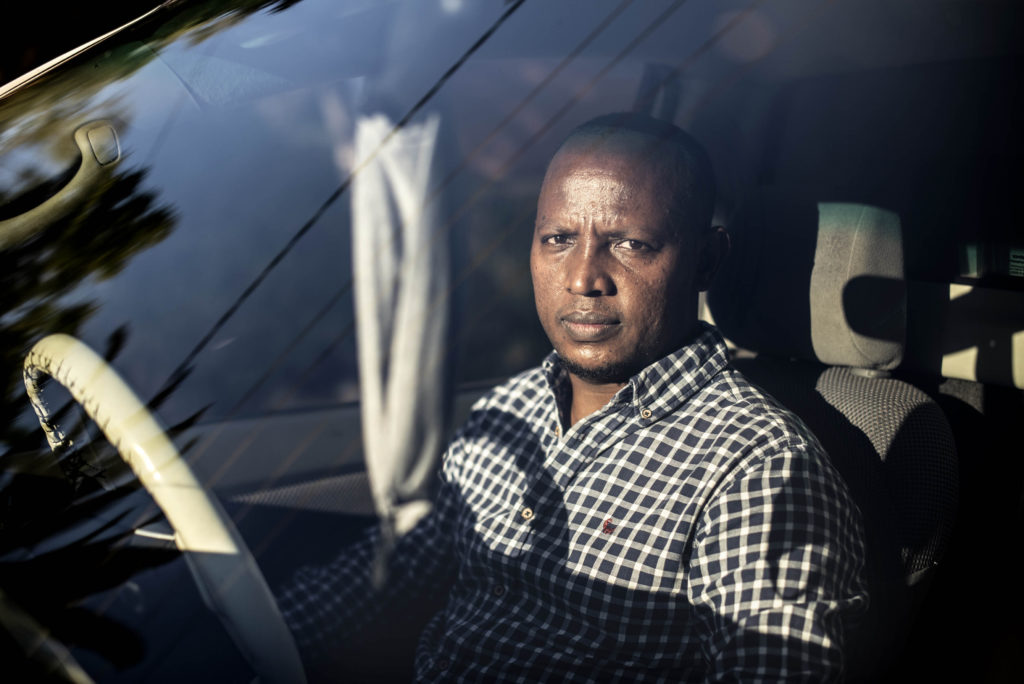 Shop owner Ashebo Nigussie, who locals call “Lukas”.
Shop owner Ashebo Nigussie, who locals call “Lukas”.
His house is about 400m from his shop and from his stoep he looks down into the lush valley where cows and horses graze, touching the furthest corner where the spire of the Moravian church announces itself.
The white benches on two levels inside the Moravian church can accommodate 600 people. The compound is a mini town square, complete with different trade buildings that stand as testimony to its history. Behind it lie the carefully kept graves of the earlier German missionaries and their families. Further on, past a fruit grove, is the Khoi compound with its matjieshuise. The graves of the Khoi are higher up the hill, overgrown and near impossible to recognise, the occasional purposely placed stone offering traces of who had come before.
“God shows us happenings in the spirit, and God appears to us for various reasons. God wants to warn us when something is going. That is why we have to make time for God.” The voice of dominee Martin Wyngaard, boomed across the valley through speakers at the windows of the church. His words, on the Sunday after George Juries had blocked the road to Genadendal, were interspersed with that sing-song emphasis and earnestness that is the preserve of preachers.
A few hundred meters away, parishioners sat on their respective stoeps, clutching a Bible or hymnal. Outside the church, about 20 people swayed with their raised hands, betraying them as not from the Protestant tradition. By the time the familiar lament of Because He Lives carried out over the PA system, the evangelical group, from a church in neighbouring Greyton, had started making their way through Genadendal to bless its various buildings.
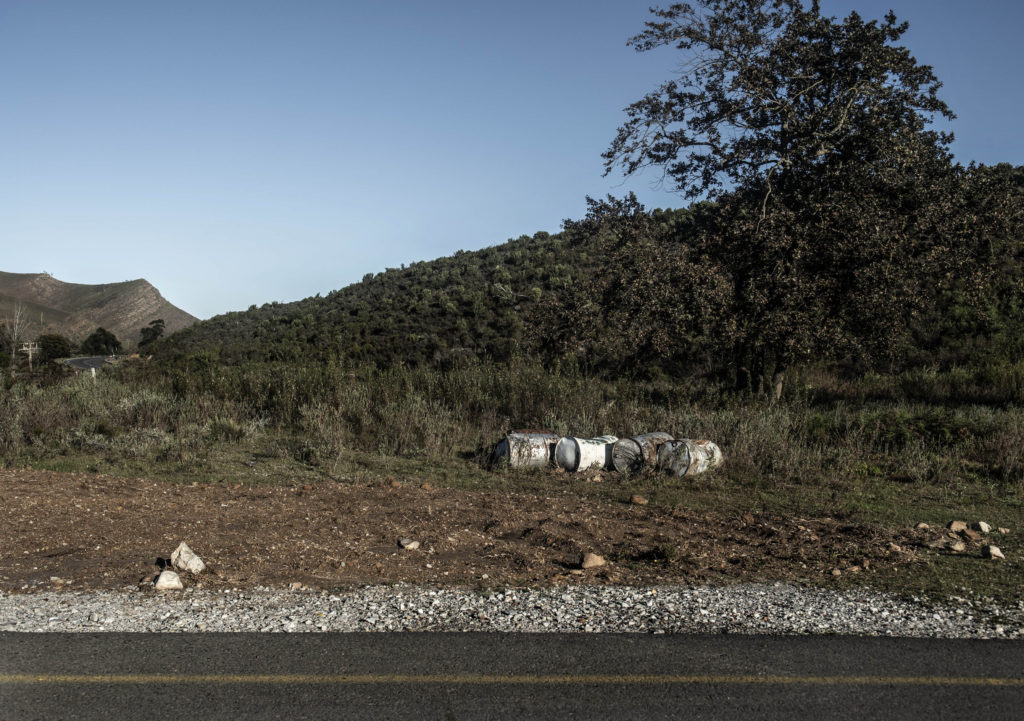
At the entrance to the village, George Juries, with his spectacles precariously perched at the edge of his nose, peered at the group praying outside the police station. His blockade, which had attracted the attention of the provincial authorities, hadn’t lasted the weekend. “If they want to send blessings why can’t they do it from their church?” he said.
* Not their real names.